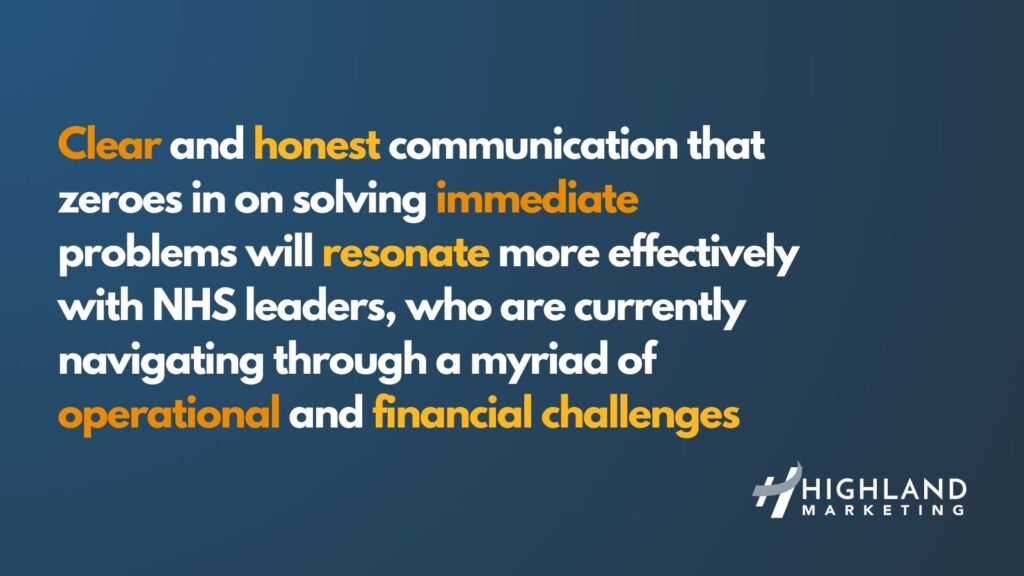Tech companies and healthcare providers must acutely recognise and respond to the NHS’s ongoing crisis, shaping their healthcare marketing strategies to address these specific and urgent challenges. This recognition and response are vital for forging successful collaborations within the NHS framework and for effectively targeting the healthcare market.
As the NHS grapples with unprecedented stress and crisis, health tech companies and healthcare providers must adapt their marketing strategies to resonate with current challenges. It is crucial for suppliers to not only acknowledge these issues but to tailor their marketing and communications in a way that demonstrates a deep understanding of these challenges. This adaptation is not just about recognising the problem but about offering precise, practical solutions that align with the immediate needs of NHS decision-makers and healthcare leaders.
Understanding the NHS environment
The NHS is a complex and multifaceted healthcare system. To effectively target the NHS audience, it’s crucial to gain a deep understanding of its structure, priorities, and challenges. With ongoing changes and reforms, staying informed about the latest developments within the NHS is essential for marketers.
The NHS is not a monolithic entity but rather a collection of trusts, clinical commissioning groups (CCGs), and various specialised organisations. Each has its unique objectives and decision-making processes. In-depth research is necessary to comprehend the intricate NHS landscape fully.
Tailoring your approach
One size does not fit all when it comes to healthcare marketing. Tailoring your marketing approach to align with the unique needs and objectives of NHS organisations is paramount. This includes crafting messages and solutions that resonate with NHS decision-makers and address their specific pain points.
To tailor your approach effectively, consider the following:
- Segmentation: Divide the NHS audience into meaningful segments based on factors like geography, specialisation, and organisational type. This enables you to create targeted campaigns that speak directly to the needs of each group.
- Personalisation: Personalised communication is more likely to capture the attention of NHS professionals. Leverage data and insights to deliver content and messages that are relevant to each recipient.
- Content Strategy: Develop a content strategy that aligns with the NHS’s priorities. This might involve creating educational resources, case studies, or thought leadership content that demonstrates your expertise in addressing NHS challenges.
Leveraging digital marketing
In today’s digital age, digital marketing plays a pivotal role in reaching healthcare audiences. Explore the power of online channels, content marketing, and social media to connect with NHS professionals. Additionally, consider the role of telehealth and telemedicine in your marketing strategies, given their increasing relevance.
Digital marketing offers several advantages in the context of targeting the NHS audience:
- Accessibility: NHS professionals are often pressed for time. Digital channels provide accessible and convenient ways for them to access information and engage with your offerings.
- Data insights: Digital marketing platforms provide valuable data insights. You can track the engagement levels of your campaigns, monitor which content resonates most with your audience, and adjust your strategies accordingly.
- Cost-efficiency: Digital marketing can be cost-effective compared to traditional methods. It allows you to reach a wide audience without the substantial expenses associated with print or broadcast advertising.
Navigating regulatory and compliance challenges
The healthcare sector is subject to strict regulations and compliance requirements. Healthcare marketers must be well-versed in these regulations to ensure that their strategies and communications remain compliant. Failure to do so can result in legal and reputational risks.
Compliance in healthcare marketing encompasses various aspects:
- Data privacy: Ensuring the privacy and security of patient data is paramount. Compliance with data protection regulations, such as GDPR, is essential when handling patient information in marketing campaigns.
- Transparency: Healthcare marketing materials should be transparent and accurate. Avoid making false claims or misrepresenting products or services.
- Ethical considerations: Ethical marketing practices are crucial in healthcare. Marketers should consider the ethical implications of their campaigns, especially when promoting medical treatments or services.
Meeting these regulatory and compliance challenges requires careful planning and adherence to industry standards. It’s advisable to work with legal and compliance experts who specialise in healthcare marketing to navigate this complex terrain successfully.

Measuring success and ROI
Effective healthcare marketing is not just about reaching the right audience but also about measuring success and return on investment (ROI). Explore key metrics and analytics tools that can help you assess the impact of your marketing efforts and make data-driven decisions for continuous improvement.
Metrics to consider when measuring healthcare marketing success:
- Conversion rates: Track the percentage of NHS professionals who take desired actions, such as signing up for newsletters, requesting information, or making inquiries.
- Engagement metrics: Monitor engagement levels with your digital content. This includes metrics like click-through rates, time spent on pages, and social media interactions.
- Lead generation: Evaluate the quality and quantity of leads generated through your marketing efforts. Determine which channels and campaigns are most effective at bringing in potential customers.
- ROI analysis: Calculate the return on investment for each marketing campaign. Assess whether the revenue generated from marketing activities exceeds the costs incurred.
Effective measurement and analysis of these metrics enable healthcare marketers to refine their strategies continually. It’s an iterative process that involves testing different approaches, learning from the results, and optimising future campaigns based on data-driven insights.
Partnering for successful NHS healthcare marketing
In the unique and challenging environment of NHS marketing, collaborating with a knowledgeable partner can be instrumental. Highland Marketing, with its expertise in sales acceleration, brand building, and market analysis, provides the necessary support and guidance to navigate this landscape effectively. Contact Highland Marketing to explore how your healthcare organisation can develop tailored marketing strategies that not only resonate with NHS decision-makers but also deliver tangible results and ROI.


